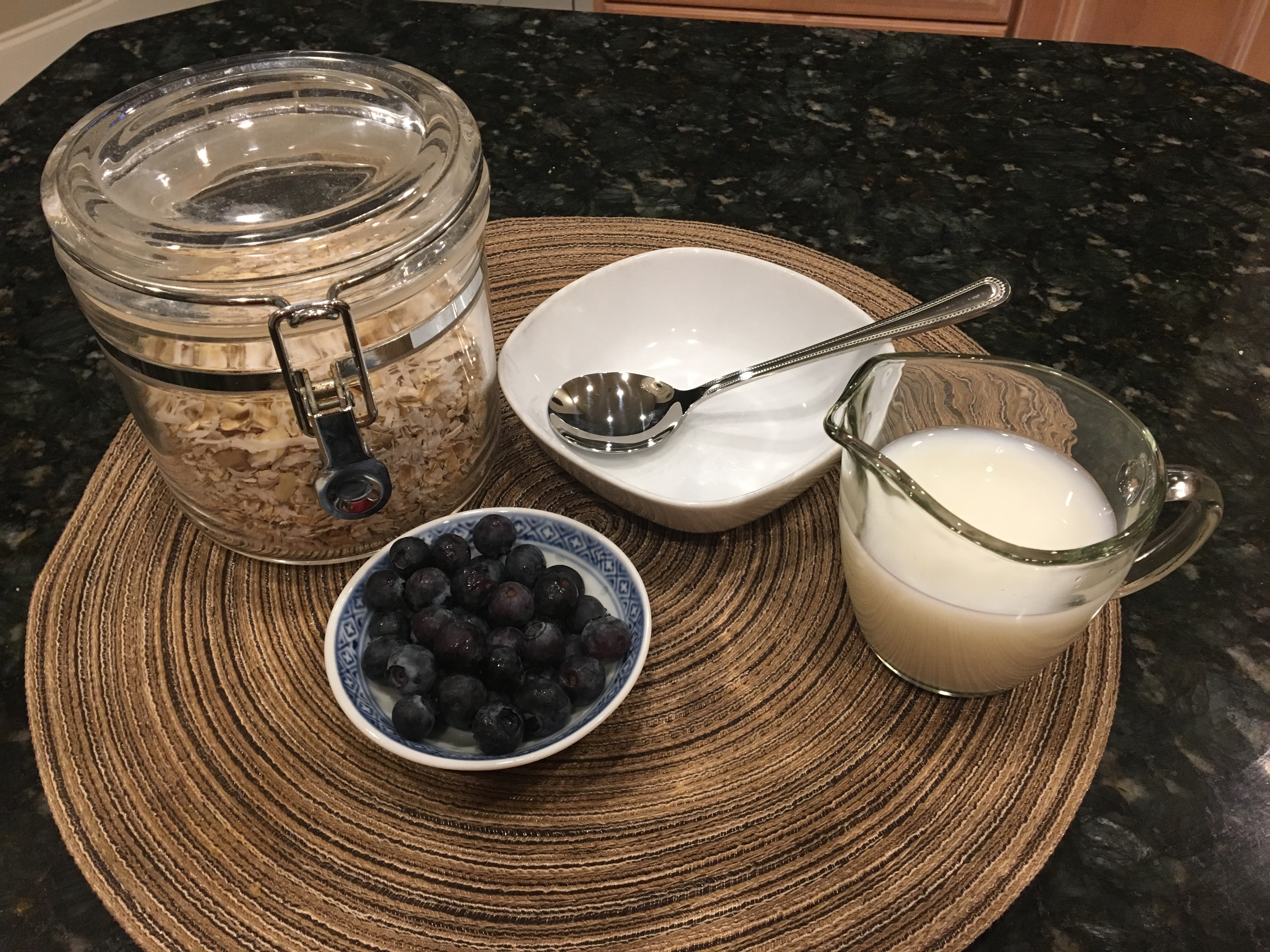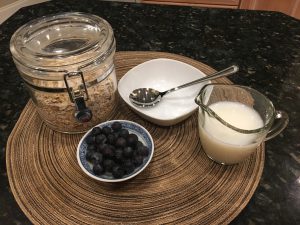
by Pam Allen | Jun 23, 2018

Start Your Day with Whole Grains Photo Source: Pamela Allen
Don’t let the heat of the summer months deter your path to a healthy diet. Stay focused and take small steps that can make a difference in your health. Breakfast is an important part of a healthy diet. Most of us struggle with what to have on hand that is quick, healthy and gets us on track for our daily intake of healthy food. Start your day right by eating whole grains.
The two types of grains are whole and refined. Grain products include bread, pasta, cereals, rice, corn, oatmeal and barley. The United States Department of Agriculture (USDA MyPlate) recommends that people of all ages get half their grain servings from whole grain sources. How do you determine what is whole grain and what is refined? Read the food’s Nutrition Facts label and know the symbol for whole grains. The “Whole Grain Stamp” is a visual symbol placed on the label that identifies foods approved by the Whole Grains Council. Also look at the list of ingredients and if whole grains are listed first, it is a good source of whole grains. Remember that ingredients are listed from most to least so whole grains should be up in the top part of the ingredient list to be beneficial.
Whole grains provide a good source of fiber and B vitamins. Fiber is the carbohydrate that is non digestible. Fiber keeps our digestive system regular and also can help reduce blood cholesterol. A good goal for women is to consume 25 grams each day while men need 38 grams for their daily intake. For specific recommendations visit https://www.choosemyplate.gov/ . Other sources of fiber include fruits and vegetables, seeds, nuts, and beans.
So now back to breakfast, the first meal of the day. Making your own cereal can be healthy and nutritious. Start with a whole gran like oats. This is the base for homemade granola and also can be cooked as a hot cereal. Try this homemade granola recipe to have available for a whole grain option for breakfast.
Homemade Granola
2 cups of old fashioned whole grain oats
½ cup sliced almonds or other nut like pecans or walnuts
½ cup shredded coconut
2 Tablespoons of Maple Syrup or honey
1 Tablespoon of melted coconut oil to coat the oats (can be melted in the microwave for 10 seconds)
¼ teaspoon of vanilla extract
Optional: ½ cup sunflower seeds, ½ cup of dried fruit
Directions
Preheat the oven to 300º F.
Combine all ingredients in a large bowl. Mix well and toss to coat.
Spread the mixture in a thin layer on a baking sheet lined with parchment paper and bake for 10 – 15 minutes, until very lightly toasted. Allow to completely cool before storing.
Granola can be kept in an airtight container in a cool, dry place for up to 2 weeks.
To use as a morning cereal, scoop ¾ cup and cover with Milk. For added flavor and fiber, add fresh fruit like blueberries or strawberries. May also be eaten as a snack or a topping for yogurt sundaes.
For information about upcoming UF IFAS Extension programs in Okaloosa County, visit our website at:
http://sfyl.ifas.ufl.edu/okaloosa email: pha@ufl.edu or call us at 850-689-5850
“An Equal Opportunity Institution”
by Dorothy C. Lee | Aug 22, 2013

Fuel your brain with a healthy, balanced breakfast.
Waking up is hard enough to do, but it is especially difficult for people who are not “morning” people, who would like to avoid that time of day altogether, and who don’t generally want breakfast. Nevertheless, the sun is still going to rise, people still have to get up, and breakfast still is the most important meal of the day. Because traditional meals play a significant role in providing daily recommended levels of essential nutrients, nutritionists often cite breakfast as the day’s most important meal and as the foundation of healthy eating habits.
Despite these recommendations, millions of Americans, in the rush to get to work, school, and other activities, often skip breakfast, thinking there is not enough time to prepare and eat a good well-balanced morning meal. Studies show that eating habits developed during childhood have the potential to last a lifetime, and children who tend to omit breakfast will likely continue this dietary habit well into adulthood. Studies also have shown that eating breakfast is associated with improved strength and endurance throughout the day and a better attitude toward school or work.
The role of breakfast in helping children perform at peak levels in the classroom was first documented more than 45 years ago at the University of Iowa Medical College. Researchers found that children who skipped breakfast had trouble concentrating at school and often became inattentive, irritable, restless, and fatigued by late morning—all behaviors counterproductive to learning. The behaviors were linked to low blood sugar levels which had not been replenished by a morning meal.
Breakfast helps to replenish blood glucose levels, which is important since the brain itself has no reserves of glucose, its main energy source. Sustained mental activity requires a large turnover of brain glucose and its metabolic components. After a fast of eight or nine hours, refueling at breakfast will make you feel and perform better during the day.
Here are some quick tips to help you avoid the temptation to be a breakfast skipper:
- No time? Build a breakfast around foods that are ready-to-eat or take little preparation time. For example: fresh and canned fruits; milk; yogurt; cheese; cottage cheese; ready-to-eat cold cereals; fruit smoothies; and instant breakfast mixes.
- Take it to go. Try celery stuffed with a meat or cheese spread or peanut butter; dried fruits; vegetable juices; or yogurt.
- Perk up cereals. Top cereals with fruit or stir chopped nuts, such as walnuts or almonds, into cooked cereals. Try adding dried fruit or granola.
- Not hungry yet? Drink juice or a fruit smoothie. Something is better than nothing! Have some bread or crackers later in the morning, then drink some milk and eat some cheese, an egg, or some peanut butter.
- Don’t skip breakfast if you’re on a diet. There is no evidence that skipping meals will help you lose weight. In fact, studies show that most people who skip breakfast tend to eat more later in the day. Some may even unintentionally select more calorie-dense foods.
Balanced breakfast choices can help provide the healthy edge needed for optimal physical and cognitive performance for children as well as adults. For those who don’t yet eat breakfast, it’s never too late to wake up to a healthy start!
For more breakfast suggestions, check out Breakfast Ideas and Breakfast on the Go.
Reference: United States Department of Agriculture, Human Nutrition Information Service



